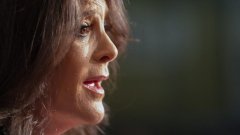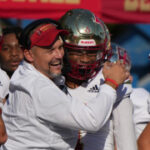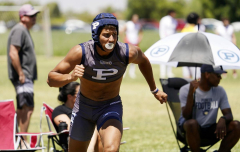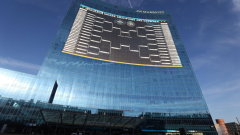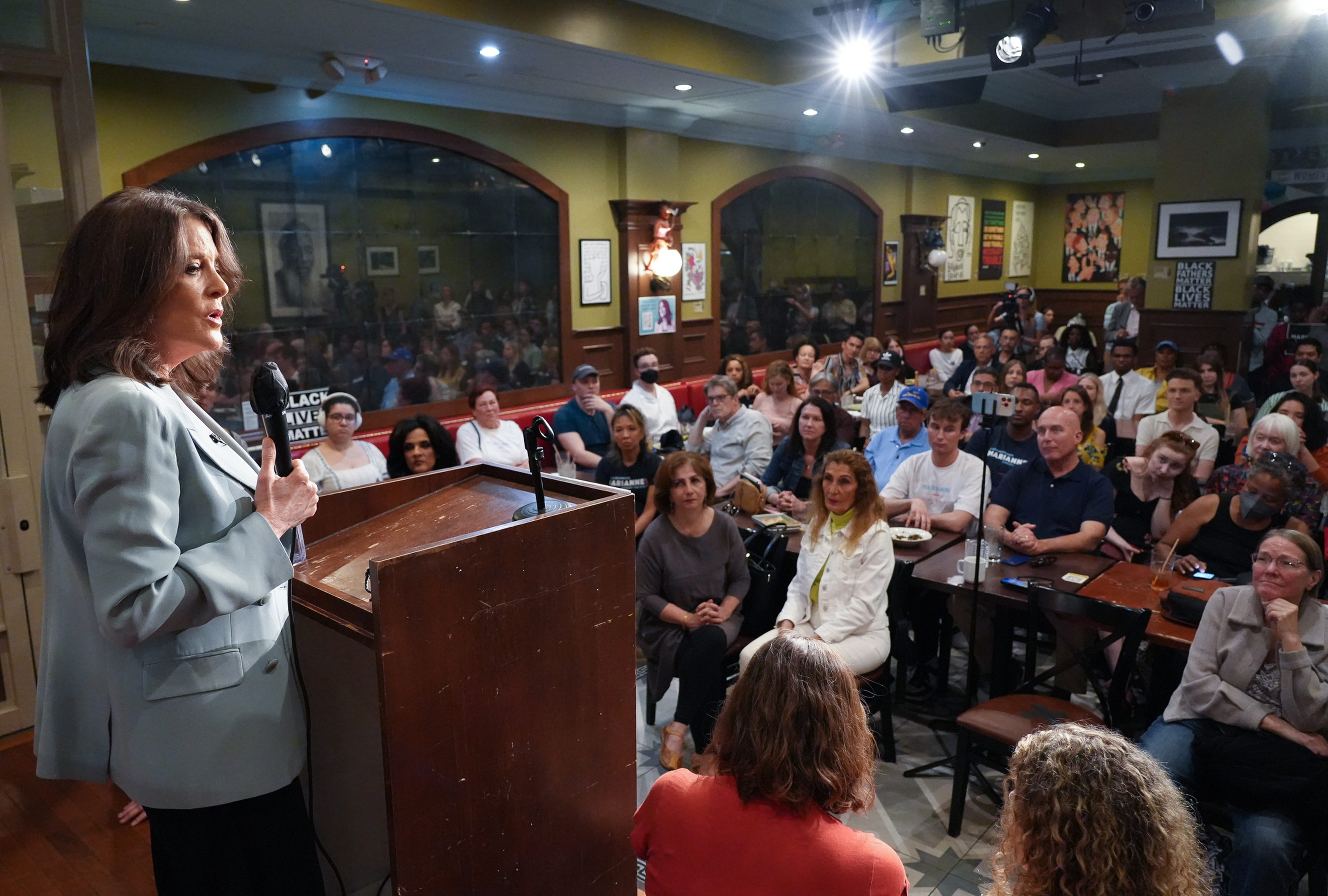
Marianne Williamson, wearing a powder-blue blazer, approached a podium draped by two American flags in a Washington, D.C. restaurant during a May campaign stop.
One supporter chanted “Marianne.” Another snapped their fingers in support. And one attendee shook from excitement and burst from his seat as Williamson leaned on the podium, took the microphone off its stand to accentuate a point and paced on the small stage as champions in the crowd hung onto her every word.
She received two standing ovations.
The early campaign event signified one of the first for the Democratic candidate since announcing her second bid for the White House after first vying for the presidency in 2020.
Four years ago, the self-help author stood on the end of a presidential debate stage next to nine other contenders all vying for the Democratic nomination and delivered a message to former President Donald Trump that became a defining moment of her first campaign.
“You have harnessed fear for political purposes and only love can cast that out,” she said during her closing statement, later continuing, “I’m going to harness love for political purposes. I will meet you on that field and sir, love will win.”
The love-will-win delivery cast Williamson as, in her words from 2019, “vulnerable to mockery.” Now in her second attempt at the presidency, the candidate is concentrating on her other positions − campaigning on changing what she says is the “unsustainable status quo” that she believes is destroying the middle class and creating hopelessness for Americans.
She contends that a majority of current policies are geared toward making things easy for the wealthy at the expense of those less well off, creating a system where too many people are “locked out” of opportunities as children.
The campaign is filling a void, especially for younger voters looking for a fresh message from someone who doesn’t have a legacy in politics, such as her primary opponents President Joe Biden or Robert F. Kennedy Jr. Someone who, as Williamson vows she would do in office, shake up the corrupted system.
Touted as Oprah Winfrey’s “spiritual advisor” − the TV show host called her “a spiritual friend and counselor” after she began making frequent appearances on “The Oprah Winfrey Show” in the early 1990s − Williamson believes in a universal healthcare system, forgiving student debt, reparations to the descendants of slaves, addressing the environmental crisis and protecting abortion rights.
A Williamson presidency would signify a “political awakening” in the country, she says.
It’s a mission that appeals to younger voters and mirrors the successes of former presidential candidate Sen. Bernie Sanders, I-Vt. A USA TODAY/Suffolk University June poll found nearly a quarter of voters would support an unspecified independent contender over Biden, who is backed by 34%, and Trump, backed by 32%.
But the 70-year-old candidate is a longshot. A May CNN poll only shows her around 8% among Democratic voters.
Williamson likens the country and “status quo incremental politics” to a ship that is headed toward an iceberg.
“We need to do more than hit the iceberg at a different angle. We need to turn this ship around,” she said to the Washington, D.C. crowd.
Why run for president?
Williamson has spent decades on stages talking to crowds and holding seminars as a spiritual leader with a “love conquers all” approach.
She told USA TODAY during a May interview she’s always been involved in charitable work and nonprofit activism during her 40-year career. She has described her work as helping people, individuals and organizations “endure and transform times of chaos.”
“But I began to see that no amount of private charity can compensate for basic lack of social justice,” she said.
Her brother, Peter Williamson, who she grew up with in Houston, told USA TODAY their father may have had an influence on Williamson and her ideas. An immigration lawyer, he would wake up at 4 a.m. every day to read the local newspapers as well as The New York Times and the Washington Post.
Peter, also an immigration lawyer, recalled how their father one day asked Williamson where she got all her ideas.
“She said, ‘From you, daddy,’” Peter said. “He was the center of an awful lot of powerful, psychological activity there.”
The first time he heard his sister speak publicly, Peter was impressed.
“She came out. She had no notes, not a single piece of paper. She did not stand behind the podium. She walked back and forth across the stage talking the whole time,” he said.
Her first trial in politics came in 2014 when she ran unsuccessfully for a House seat as an independent for California’s 33rd congressional district.
Five years later, she set her sights higher and declared she would run for president in January 2019. She suspended her campaign one year later and endorsed Democratic presidential candidate Sanders.
A self-help author, Williamson wrote 15 books, four of which have topped the New York Times bestseller list. Most center around the themes of love and spirituality.
Williamson is adding the 2024 presidential race to her resume because she says it’s time for the country to change.
“Kids are getting out of college and they don’t know how they’re going to make it. It’s unsustainable. It’s immoral. It’s unjust, and it’s un-American,” she told USA TODAY. “So why did I get in? Because I’m not the kind of woman who’s going to be silent about something like this.”
Who is running in 2024? A closer look at every candidate so far.
First day in the White House: Here’s Williamson’s plan
At another May campaign event on the 13th floor of the National Press Club in Washington, D.C., Williamson debuted her 21st Century Economic Bill of Rights. Its wide-ranging targets include everything from workplace rights to environmentalism, as well as the right to healthcare and the right to cost-free higher education.
“Some level of economic anxiety is now a feature, not a bug, of the American experience,” she said during her speech, calling economic hardships a form of “modern oppression.”
She told USA TODAY she has a long list of actions she would take on her first day in office: Cancel the Willow project, an oil drilling project in Alaska; audit the Pentagon; reschedule marijuana; lower pharmaceutical drug prices; cancel government contracts with union-busting companies and form a council of experts on everything related to childhood.
Her long-term goal centers around children and making every public school a “palace of learning and culture and the arts.”
“I want to be the children’s president,” she said.
She pointed to money in politics as the “cancer underneath all other cancers” in the country and said she agrees with her Democratic opponent Kennedy that a major threat to the country is the “corporate hijacking” of the government.
Dai Poole, of Norfolk, Virginia, attended two of Williamson’s recent campaign events in D.C. and compared her speaking to that of former President Barack Obama.
“She really understands where the people are and has an ability to speak to our issues where it doesn’t matter if you’re Democrat, Republican, political, apolitical,” the 29-year-old freelance writer said.
Making the case to Gen Z
Williamson’s message has resonated with younger voters.
The candidate has built a large audience on TikTok, with nearly half a million followers − the most of any presidential candidate who has an official account on the platform. She posts several times a week with clips of her giving interviews, appearing behind the scene

